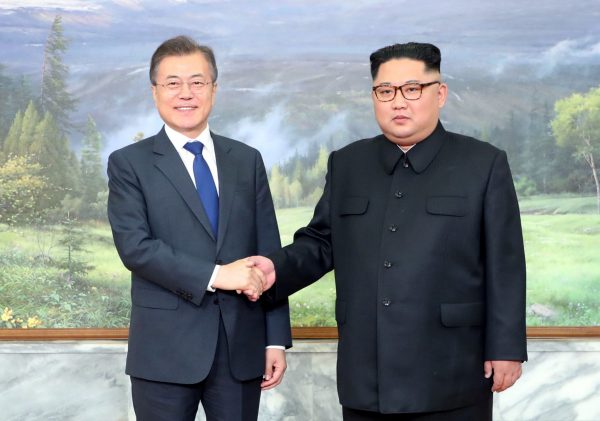His reforms began by freeing local markets while keeping them technically illegal. This policy has achieved early success. By building a credible nuclear force, he has advanced a powerful argument that the country no longer needs to invest everything in tanks and planes, so his generals should tolerate spending more on economic development. Investments by South Korean companies would ensure long-run success in this regard.
New North Korean priorities have additionally spawned a new diplomacy more accommodating to peace. Since the Korean War, Pyongyang had derided South Korea as a pawn in a US-occupied zone. Under Kim Jong-un, it is treating South Korea mainly as a fellow Korean regime.
Conversely, Seoul has a sophisticated leadership that is determined to make peace. Past conservative governments in Seoul have, with exceptions, largely refused to engage the North. The previous liberal government was inexperienced and naive. By contrast, current South Korean President Moon Jae-in is experienced and has sophisticated advisors. The conservative opposition, which remains in disarray after the scandals surrounding previous president Park Geun-hye, cannot easily sabotage Moon’s initiative, but the powerful military, respected conservative voices and a nationalistic public will ensure that any agreement does not jeopardise South Korea’s safety.
Outside the Korean Peninsula, circumstances have also changed to accommodate peace.
China, fed up with North Korea’s provocations, is ready for a peace agreement. Because of the nuclear dispute, Xi Jinping and Kim Jong-un had engaged in no meetings prior to the peace initiative. The two countries have a profoundly antagonistic relationship. The great acceleration of Pyongyang’s nuclear program was an angry response to China’s 1992 recognition of South Korea. Kim Jong-un killed his uncle and his half-brother for being too close to China. China tightened its sanctions this year.
Starting last year, for the first time in many years Chinese officials have been willing to speculate, cautiously, in private forums about a unified Korea. Likewise, retired officers have suggested that, if Washington were to offer Pyongyang a peace treaty, security guarantees, diplomatic recognition and an economic opening, and if Pyongyang still refused to denuclearise, Beijing might come down very hard on the North. Above all, China knows that Beijing and Shanghai are primary potential targets of North Korean nuclear weapons, and it is determined to defuse that threat.
Notwithstanding the appalling chaos around US President Donald Trump, the US administration is willing to incur risk for peace — more so than previous administrations. When the United States sends top-level people (notably Jimmy Carter) to deal with North Korea, it gets a deal. When the United States sends someone relatively junior (as it did when it sent an assistant secretary to deal with national leader Kim Jong-il), North Korea feels insulted and resists compromise.
While Washington experts are eloquent about Pyongyang’s unreliability, they ignore Washington’s unreliability. George H W Bush raised North Korea’s expectations very high by withdrawing tactical nuclear weapons from South Korea, cancelling Team Spirit military exercises and agreeing to talk to the North directly, which enabled the two Koreas to sign a joint declaration on denuclearisation. Following this, without coordinating with the State Department, then Defense secretary Dick Cheney reinstated Team Spirit, and Bush’s successor Bill Clinton initially failed to sustain Bush’s initiative. George W Bush expected North Korea to collapse, and conservatives in his administration opposed the 1994 Framework Agreement reached under Clinton, so he too failed to follow through on deals that Washington had made with Pyongyang. Fortunately, many respected former US officials are prepared to insist that this time Washington must honour its promises.
Finally, this time both Koreas are pondering not just nuclear armistice but also broader Korean unity. Everyone fears sudden unification: China because of military and immigration chaos, North Korea because of leadership survival, South Korea because of unbearable financial cost. But a declaration of ‘one nation, two states, gradual unification’ would avoid chaos, secure the lives and positions of North Korean leaders and minimise the cost to South Korea. Incrementalism would see South Korean conglomerates building factories to use cheaper North Korean labour, North Korean incomes and acculturation improving fairly rapidly, and controlled migration gradually mingling North Korean peasants with the South Korean middle class. Managing this would be difficult and delicate but not inconceivable.
Chinese military officers fret about US troops moving to their Yalu River border. US officers fret about a unified Korea becoming a pawn of China and about North Korea taking over the south. These fears lack reality. Replacing the risk of nuclear war with peace would be well worth US military limitations or even eventual withdrawal. Korean nationalism would prevent a united Korea from being either China’s or America’s pawn. South Korea’s population and huge economy dwarf North Korea’s; sloths do not devour tigers.
Most Korea experts obsess over what could go wrong in the coming negotiations. Kim Jong-un could try one more secret nuclear hedge. The North Korean military could depose Kim for cutting conventional weapons and then cutting back nuclear. US National Security Advisor John Bolton may counsel war. Trump might continue to insist that Pyongyang do everything before Washington does anything. A new US president could renege on past deals. Improved conditions for deal making provide no guarantee of success. But all parties’ moral obligation is to find every possible way to overcome obstacles, not just to fatalistically list them. The imperative is a defensible peace and the avoidance of nuclear war.
William Overholt is a Senior Fellow at Harvard University. He published the first book on nuclear proliferation in Asia (Asia’s Nuclear Future, 1976) following successful US efforts to terminate South Korean and Taiwanese nuclear weapon programs. His latest book is China’s Crisis of Success (2018).

